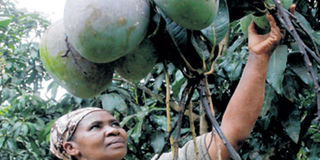Poor policies on use of bio-fertilisers stifling sector

As the government continues to invest in fertiliser price reduction initiatives in line with Vision 2030, experts have pointed out that there is need to have clear policies that support integrated soil fertility management approaches for meaningful food production. FILE PHOTO |
What you need to know:
- Bio-fertiliser, as the scientists put it, is a substance which contains living micro-organisms that when applied to seeds, plant surfaces or soil colonises the rhizosphere or the interior of the crop and promotes growth by increasing the availability of primary nutrients to the host plant.
- So far, countries like Argentina, Canada, South Africa, India, Australia, the Philippines and the US have already embraced the use of bio-fertilisers and are reaping the benefits of improved agricultural productivity.
- Development of effective regulatory framework will, therefore, ensure that farmers have access to quality, safe, efficacious and affordable products that will help them increase productivity.
As the government continues to invest in fertiliser price reduction initiatives in line with Vision 2030, experts have pointed out that there is need to have clear policies that support integrated soil fertility management approaches for meaningful food production.
Even with subsidies, it remains clear that majority of smallholder farmers do not use fertiliser because they cannot afford it. Yet researchers have repeatedly pointed out that most of the food eaten all over the world is produced by the very smallholder farmers.
It means that if the smallholders were empowered to double their yields, then it will be possible to reduce hunger, and boost food and income security for communities.
One of the possible enabling environments, according to scientists from the International Institute of Tropical Agriculture (IITA) and the African Agricultural Technology Foundation (AATF), is for African countries to have effective regulations for commercial production of bio-fertilisers and bio-pesticides as a way of opening up new opportunities for smallholder farmers to achieve increased yields without incurring costs beyond their financial ability.
PROMOTES GROWTH
Bio-fertiliser, as the scientists put it, is a substance which contains living micro-organisms that when applied to seeds, plant surfaces or soil colonises the rhizosphere or the interior of the crop and promotes growth by increasing the availability of primary nutrients to the host plant.
There are artificially multiplied cultures of certain living organisms that can improve soil fertility and, therefore, crop productivity.
However, it is important to note that if need be, such bio-products should be used alongside other conventional farm inputs such as chemical fertilisers, and practices such as agro-forestry, among others.
Through an ongoing evidence-based study in six African countries, including Kenya, aimed at supporting farmers’ decisions to access quality commercial products, the IITA and AATF researchers have found out that African smallholder farmers can easily double yields if they improve their soil fertility using integrated methods, which include proven bio-fertiliser technologies.
So far, countries like Argentina, Canada, South Africa, India, Australia, the Philippines and the US have already embraced the use of bio-fertilisers and are reaping the benefits of improved agricultural productivity. This is because the governments have effective regulations for commercialisation of such products.
Despite the inadequate regulatory aspects in Kenya, a number of agencies are utilising existing laws to come up with promising products to smallholder farmers. In western Kenya for example, smallholder farmers have already adopted bio-fertiliser products, the most common being Bio-Fix, a brand of nitrogen-fixing bacteria which was developed by the University of Nairobi in collaboration with MEA Fertiliser Ltd in 1981. Farmers are using the product for planting soybean.
ADVANTAGES
Such bio-products are said to have several advantages. These are; they are cheaper than chemical fertilisers; they provide up to 25 to 30 per cent of chemical fertiliser equivalent of nitrogen; they provide phosphorous and potassium and increase water absorption, thus, keeping soil biologically active.
In their work, IITA and the AATF researchers have found out that among the six countries including Kenya, there is inadequate or incomplete policies and guidelines for regulation of bio-fertilisers and bio-pesticides. As well, there are multiple and often overlapping regulatory mandates by government agencies.
Therefore, due to inadequate regulatory provisions in the countries under the study, manufacturers and sellers of commercial bio-fertilisers do not have solid guidelines to help them assure farmers of quality, and as a result, the smallholder farmer who buys the products lacks the guarantees on the efficacy of such products.
Development of effective regulatory framework will, therefore, ensure that farmers have access to quality, safe, efficacious and affordable products that will help them increase productivity.
The government should, therefore, take advantage of such research findings and speed up the process of developing policies on bio-products for the benefit of, particularly, the smallholder farmers.
Isaiah Esipisu is a journalist specialising in agriculture and climate change reporting. [email protected].





